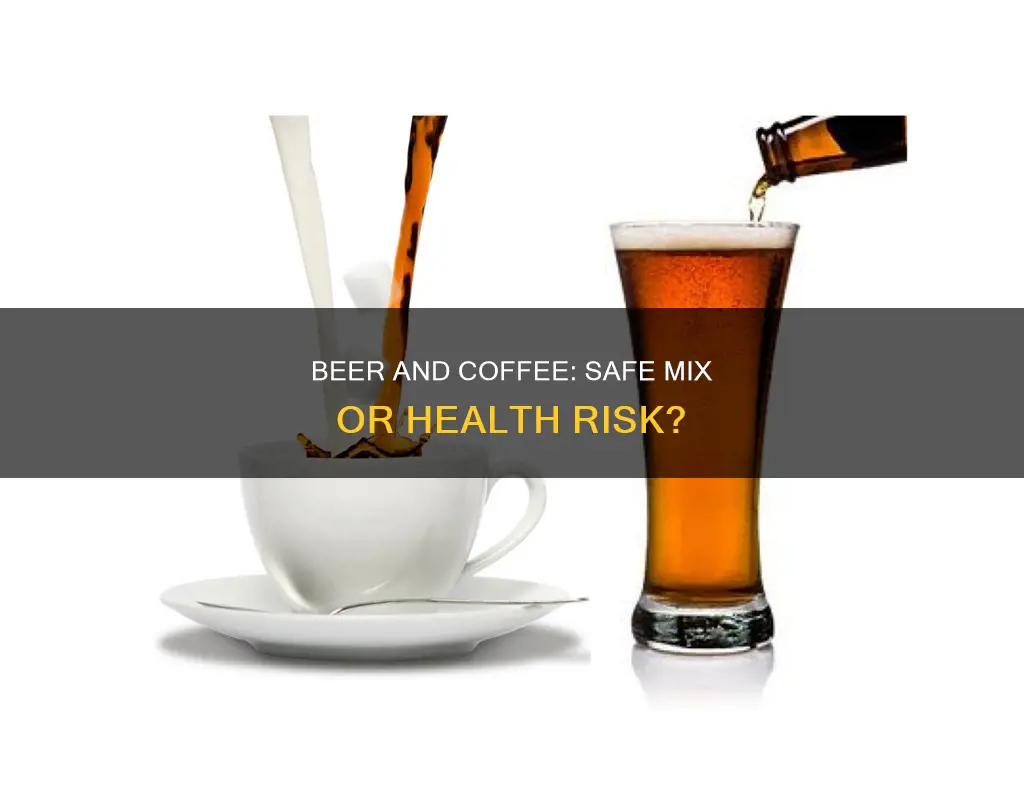
Mixing caffeine and alcohol is a common practice, with many popular drinks combining the two, such as Irish coffee, rum and Coke, and Jagerbombs. But is it safe? The short answer is no. While the combination may make you feel more alert and energetic, it can also mask the effects of the alcohol, leading to increased drinking and a higher risk of alcohol poisoning, injury, and long-term health issues.
| Characteristics | Values |
|---|---|
| Mixing caffeine and alcohol | Generally not recommended |
| Caffeine's effect on alertness | Masks the effects of alcohol |
| Alcohol's effect on alertness | Makes you feel sleepy or less alert |
| Combined effect | Increased alertness and energy |
| Effect on blood alcohol level | No impact |
| Risk | Higher risk of drinking more than usual |
| Risk | Increased risk of driving while intoxicated, alcohol poisoning, or injury |
| Energy drinks | Contain high levels of caffeine and sugar |
| Energy drinks and alcohol | Linked to increased risk of injury and binge drinking |
| Caffeinated alcoholic beverages | No longer sold in the US due to FDA regulations |
| Combining caffeine and alcohol | May lead to intoxication, alcohol poisoning, liver and kidney issues |
| Caffeine and alcohol consumption | Best to separate by at least one hour |
| Dehydration | Possible side effect |
| Alcohol poisoning symptoms | Confusion, severe loss of coordination, being conscious but not responsive, irregular breathing, slowed breathing, difficulty staying conscious, passing out |
What You'll Learn

Caffeine and alcohol do not cancel each other out
The belief that caffeine and alcohol cancel each other out is misleading. When you mix a stimulant with a depressant, the stimulant can mask the effects of the depressant. In the case of caffeine and alcohol, caffeine can make you feel more alert and energetic, even though the alcohol is still affecting your body. This masking effect can lead to dangerous consequences.
The masking effect of caffeine on alcohol can lead to drinking more than intended. When you feel more alert and less impaired, you may be inclined to consume more alcohol. This can result in drinking more than your body can handle, increasing the risk of alcohol poisoning, which can be life-threatening. Additionally, drinking more alcohol can lead to impaired judgment, increasing the likelihood of engaging in risky behaviours, such as driving under the influence or having unprotected sex.
Consuming caffeine with alcohol can also have detrimental effects on your body. Both substances are diuretics, which cause you to urinate more frequently. This can lead to dehydration, characterised by symptoms such as dry mouth, thirst, dizziness, and lightheadedness. Dehydration can further exacerbate other hangover symptoms associated with alcohol consumption.
Furthermore, the combination of caffeine and alcohol can impact your cardiovascular system. Both substances are associated with an increase in heart rate and blood pressure. When consumed together, they can amplify these effects, particularly if you are already experiencing negative cardiovascular symptoms from either substance alone. This increase in heart rate and blood pressure can heighten the risk of cardiovascular conditions such as heart disease, heart attack, irregular heartbeat, or stroke.
While it may seem that caffeine and alcohol cancel each other out due to their opposing effects, it is important to understand that they do not. The masking effect of caffeine can lead to dangerous levels of alcohol consumption and increase the risk of health complications and detrimental behavioural outcomes. Therefore, it is generally recommended to avoid mixing caffeine and alcohol to minimise these risks.
Beer Overdose: Can Drinking Beer Kill You?
You may want to see also

Mixing the two can lead to drinking more alcohol than usual
Mixing caffeine and alcohol can lead to drinking more alcohol than intended. Caffeine is a stimulant that can make you feel more energetic and alert. On the other hand, alcohol is a depressant that can make you feel sleepy or less alert. When combined, the stimulant can mask the depressant's effects, making you feel more alert and energetic than you normally would while drinking. This can lead to drinking more alcohol than usual, increasing the risk of alcohol poisoning, intoxication, and long-term liver and kidney issues.
The combination of caffeine and alcohol can also affect your cardiovascular system. Caffeine increases your blood pressure and heart rate, while alcohol may temporarily raise your blood pressure during binge drinking. Mixing the two can be especially risky for people with cardiovascular disease or other heart conditions, as it can lead to a heart attack or stroke.
Additionally, caffeine does not reduce the amount of alcohol in your blood or how your body clears alcohol from your system. Even though you may feel more alert, you are still intoxicated and at risk of impaired judgment, such as driving while intoxicated. The energizing effects of caffeine can also disrupt your sleep, causing you to wake up in the middle of the night or resulting in a more exhausting and hungover morning.
Furthermore, mixing caffeine and alcohol can lead to dehydration, as both substances are diuretics, causing you to urinate more. Dehydration can have negative consequences for your health and well-being. Overall, while the immediate effects of mixing caffeine and alcohol may seem positive, the combination can lead to increased alcohol consumption and negative health outcomes. It is recommended to avoid mixing the two or, at the very least, to consume them in moderation and be mindful of the potential risks.
Beer and Drug Screens: What You Need to Know
You may want to see also

This combination can cause dehydration
Both alcohol and coffee are diuretics, meaning they make you urinate more. As a result, dehydration can be a concern when mixing the two. Caffeine and alcohol can also raise blood pressure, so mixing the two substances may be particularly risky for folks who have cardiovascular disease or other heart conditions.
Drinking coffee after alcohol can trick your brain into thinking that you're less drunk than you are. Alcohol sparks the release of neurotransmitters that slow down all of your brain's processes, but when you add a cup of coffee to the mix, the caffeine blocks the enzymes that control the energizing cyclic AMP. This makes you feel more energized and less drunk. However, you're still drunk, and the caffeine is not reducing the amount of alcohol in your blood.
The stimulating effects of caffeine can mask the sedative effects of alcohol, potentially leading you to drink more than you otherwise would. This can cause a spike in energy levels and an instant release of sugar into the bloodstream, which may affect the body in several ways. Mixing caffeine and alcohol can also lead to intoxication, alcohol poisoning, and liver and kidney issues in the long term.
Liquids generally take an hour to empty from the stomach, and the levels of both alcohol and caffeine peak in the blood one to two hours after consumption. Consequently, caffeine's side effects could mask those of alcohol if the two are consumed within a 60-minute period.
Beer and Meloxicam: Is It Safe to Drink?
You may want to see also

It can increase the risk of injury and dangerous behaviour
Mixing caffeine and alcohol can increase the risk of injury and dangerous behaviour. Caffeine is a stimulant that can make you feel more alert and energetic. Alcohol, on the other hand, is a depressant that can make you feel sleepy or less alert. When combined, caffeine can mask the effects of alcohol, leading to a higher risk of drinking more than usual. This increases the chances of driving while intoxicated, alcohol poisoning, or injury.
Energy drinks, which often contain high levels of caffeine and sugar, further elevate the risk when mixed with alcohol. Studies have linked the combination of energy drinks and alcohol with an increased risk of injury and binge drinking. Caffeinated alcoholic beverages, such as Four Loko and Joose, were also found to increase the likelihood of injury and dangerous behaviour. These drinks, which had higher alcohol content than beer, were marketed to youth and connected drinking with risk-taking behaviours. In 2010, the FDA warned that the addition of caffeine to these alcoholic drinks was unsafe, leading to the removal of caffeine from these products.
Even though pre-mixed caffeinated alcoholic drinks are no longer sold in the United States, people, especially young adults, still mix alcohol with energy drinks. This practice can be dangerous and lead to similar health risks as the pre-mixed caffeinated alcoholic beverages. Mixing alcohol with caffeine can result in higher blood pressure, irregular heartbeat, and dehydration. Additionally, people who mix alcohol with energy drinks are more likely to engage in unprotected sex, sustain injuries, drive while impaired, or ride with a drunk driver.
Beer and Colonoscopy: What You Need to Know
You may want to see also

It can cause a rebound effect, disrupting sleep
Mixing caffeine and alcohol can cause a rebound effect, disrupting sleep. This occurs when alcohol causes an energizing rebound in the brain a few hours after drinking, which can lead to waking up in the middle of the night. As caffeine remains in the body for about six hours, its stimulating effects can make it difficult to fall back asleep. As a result, you may wake up feeling exhausted and more hungover than usual, as both caffeine and alcohol are dehydrating.
The combination of caffeine and alcohol can also negatively impact sleep by increasing the risk of alcohol poisoning. Caffeine can mask the effects of alcohol, making it difficult to gauge how intoxicated you are. This can lead to drinking more alcohol than intended, increasing the risk of alcohol poisoning and its associated health risks, including severe loss of coordination, irregular breathing, and passing out.
Additionally, mixing caffeine and alcohol can lead to a higher risk of injury and binge drinking. The stimulating effects of caffeine can make individuals feel more alert and energetic, potentially leading to riskier behaviours such as driving under the influence or engaging in unprotected sex. The combination can also cause dehydration, as both substances are diuretics, increasing the risk of dehydration-related symptoms such as dizziness and lightheadedness.
The rebound effect of caffeine and alcohol on sleep can be particularly pronounced for individuals with cardiovascular disease or other heart conditions. Since both substances can raise blood pressure, mixing them may lead to a heart attack or stroke, even without prior warning signs of high blood pressure. Therefore, it is generally recommended to avoid mixing caffeine and alcohol to minimise the risk of disrupted sleep and other negative health consequences.
Beer and Fenofibrate: A Safe Mix?
You may want to see also
Frequently asked questions
No, it is not generally considered safe to mix caffeine and alcohol. Caffeine can trick your brain into thinking that you are less drunk than you are, which may lead to drinking more alcohol than intended.
Mixing caffeine and alcohol can lead to intoxication, alcohol poisoning, liver and kidney issues, higher blood pressure, irregular heartbeat, dehydration, and increased risk of injury or damage to the body.
If you want to drink a mixture of caffeine and alcohol, it is recommended to stick to a very small quantity. It is also suggested to wait at least an hour or two after having a cup of coffee before consuming an alcoholic beverage.







